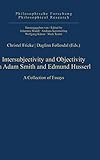Intersubjectivity and Objectivity in Adam Smith and Edmund Husserl : A Collection of Essays / ed. by Christel Fricke, Dagfinn Føllesdal.
Material type: TextSeries: Philosophische Forschung / Philosophical Research ; 8Publisher: Berlin ; Boston : De Gruyter, [2013]Copyright date: ©2012Description: 1 online resource (315 p.)Content type:
TextSeries: Philosophische Forschung / Philosophical Research ; 8Publisher: Berlin ; Boston : De Gruyter, [2013]Copyright date: ©2012Description: 1 online resource (315 p.)Content type: - 9783110325188
- 9783110325942
- 170.92/2 23
- B1545.Z7 .I58 2012eb
- online - DeGruyter
- Issued also in print.
| Item type | Current library | Call number | URL | Status | Notes | Barcode | |
|---|---|---|---|---|---|---|---|
 eBook
eBook
|
Biblioteca "Angelicum" Pont. Univ. S.Tommaso d'Aquino Nuvola online | online - DeGruyter (Browse shelf(Opens below)) | Online access | Not for loan (Accesso limitato) | Accesso per gli utenti autorizzati / Access for authorized users | (dgr)9783110325942 |
Frontmatter -- Contents -- Preface -- Introduction -- 1. A Phenomenological Approach to Intersubjectivity in the Sciences -- 2. Husserl’s Approaches to Volitional Consciousness -- 3. “We-Subjectivity”: Husserl on Community and Communal Constitution -- 4. Husserl on Understanding Persons -- 5. Imagination and Appresentation, Sympathy and Empathy in Smith and Husserl -- 6. Mengzi (Mencius), Adam Smith and Edmund Husserl on Sympathy and Conscience -- 7. Overcoming Disagreement – Adam Smith and Edmund Husserl on Strategies of Justifying Descriptive and Evaluative Judgments -- 8. Intersubjectivity and Moral Judgment in Adam Smith’s Theory of Moral Sentiments -- 9. Sympathy in Hume and Smith: A Contrast, Critique, and Reconstruction -- Contributors
restricted access online access with authorization star
http://purl.org/coar/access_right/c_16ec
Can we have objective knowledge of the world? Can we understand what is morally right or wrong? Yes, to some extent. This is the answer given by Adam Smith and Edmund Husserl. Both rejected David Hume’s skeptical account of what we can hope to understand. But they held his empirical method in high regard, inquiring into the way we perceive and emotionally experience the world, into the nature and function of human empathy and sympathy and the role of the imagination in processes of intersubjective understanding. The challenge is to overcome the natural constraints of perceptual and emotional experience and reach an agreement that is informed by the facts in the world and the nature of morality. This collection of philosophical essays addresses an audience of Smith- and Husserl scholars as well as everybody interested in theories of objective knowledge and proper morality which are informed by the way we perceive and think and communicate.
Issued also in print.
Mode of access: Internet via World Wide Web.
In English.
Description based on online resource; title from PDF title page (publisher's Web site, viewed 28. Feb 2023)


